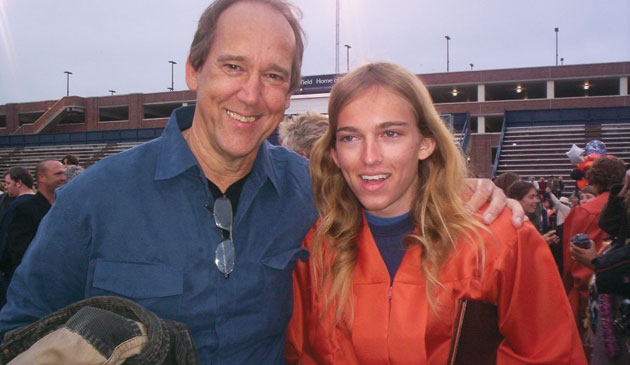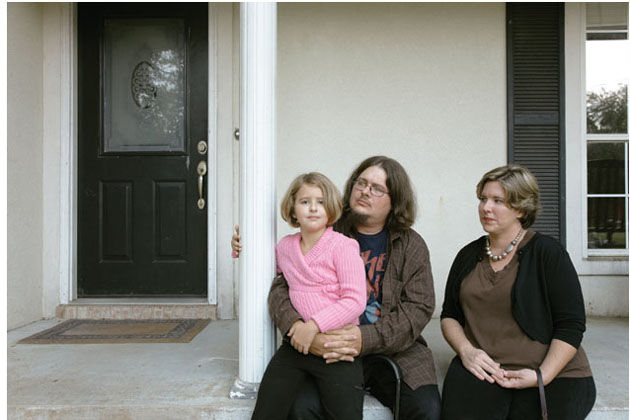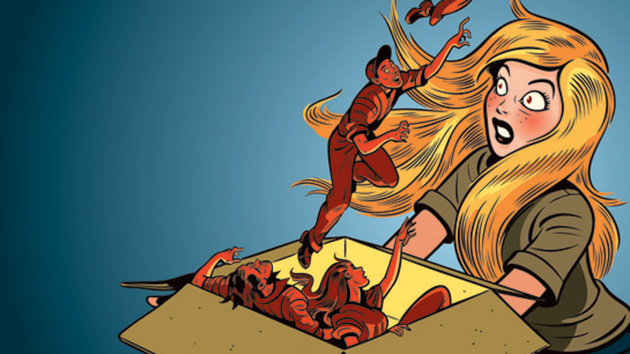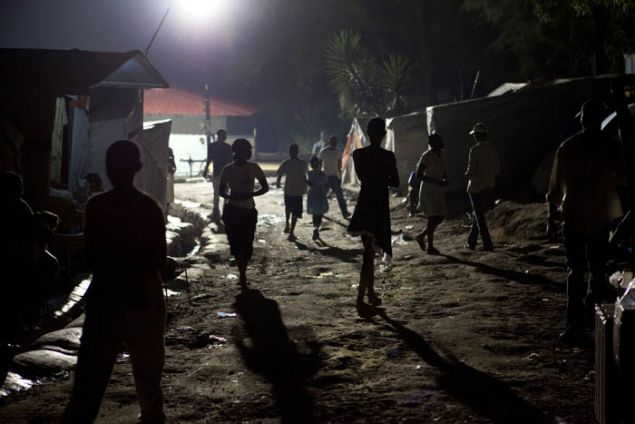
As Mother Jones‘ copy editor, I used to read the long, narrative features written by our former human rights reporter, Mac McClelland, many times over before they appeared in the magazine. They often wore me out, grammatically and emotionally, in the way that only intense work on difficult subjects can.
In her second book, Irritable Hearts: A PTSD Love Story (out February 24), McClelland returns to terrain she has covered before to great acclaim and great criticism: herself—specifically, her battle with PTSD following a reporting trip to post-earthquake Haiti in 2010. She unsparingly recounts her struggles to cope with the lingering effects of trauma: nightmares, sobbing fits, alcoholism. McClelland weaves these details into the telling of her own unexpected love story, the charming and jagged particulars of which left me, by the book’s end, expectedly exhausted.
I recently spoke by phone with McClelland about how our knowledge of post-traumatic stress is evolving, what shocked her most about dealing with trauma, and how to define a badass:
Mother Jones: Was the topic of PTSD on your radar at all before the first Haiti trip? Was it something you thought about a lot?
Mac McClelland: I was familiar with it as a concept pretty much exclusively with respect to veterans, and that is the sum total of my experience with the topic. I definitely hadn’t read any books. I probably read like one pretty famous, or maybe two, famous features about PTSD, some big ones that came out around 2003 or something. But other than that, I had nothing.
MJ: What do we still not understand as a society about PTSD and its effects?
MM: I think the most important thing that we don’t get is that it’s not just for soldiers, and that it’s for civilians—and that it’s more often for civilians than it is for soldiers. It’s really important that the work people have done around cultivating awareness for traumatized post-combat veterans, and I think that’s important and it’s great and there needs to be even more of that. But they’ve completely left civilians out of that scenario. And that’s one of the reasons why I was so unprepared.
MJ: At what point did you recognize what you were going through as PTSD? And when did you decide to go ahead and write about it?
MM: I decided on my diagnosis when it was forced upon me. I was very resistant to it, because it sounded absolutely ridiculous. I was in counseling and was subsequently in more counseling, and I had my general practitioner prescribing me Ativan and all of these people were like, “PTSD!” I mean, eventually I had to accept that it was true, and I was looking it up in the DSM, looking at the symptoms list, and I was like, “Okay, this all seems valid,” but it seems completely crazy to me that I, as a civilian who in my opinion at that time, hadn’t really been through very much, could have a diagnosis like that.
I wrote an essay about it first. I was talking to Ann Friedman, who was my editor for that piece, over Skype, from a hotel room in The Hague. I had just reached out to her and was like, “Hey, I’m thinking about this thing.” And she was like, “Oh, let’s have a conversation about this thing.” I’m not really sure where that came from. Pretty much everything that I write about, I just write about because it’s kicking around in my head a lot and it’s a thing that has to come out in some form. You’re just writing sentences about something in your head like over and over again and then you’re like, “Oh, I’m going to write about this, apparently.”
After the essay came out, I had a period somewhat related and also not entirely related to that essay just where I was in the worst shape. I think I was doing the Ohio story for Mother Jones. I went up to Cleveland to see my parents. I was sitting on the couch with my dad. A book editor had emailed me when the essay came out and was like, “Hey, that was a good essay.” That was literally all it said. It was like one sentence, and I was sitting on the couch in my dad’s house talking to him about it, and he was like, “Maybe this is going to be your thing. This is going to be your next big project. It’s going to be a thing that you’re going to write about.” And when he said that, I was like, “That’s the thing. That’s it, totally.”
MJ: In what sort of unexpected ways did the trauma resonate and surface for you? You write about falling apart on a daily basis, and not knowing exactly what was going to trigger it.
MM: Actually all of that was shocking to me. Absolutely floored me. In general, ever since I was little, I was a pretty upbeat person. I had zero experience with depression and depressive symptoms before, which a lot of people do have at some point of their lives. I didn’t know if, when I would check my email, I would read something that would just make me start sobbing, and that is so unsettling.
And part of my shock about it was one of the bigger problems because I had the symptoms, but then I had my reaction to the symptoms, which was that I was completely freaking out. I was so freaked out by my own self, like all the time. It’s one thing to be crying and then you’re sad. But it’s another thing to be panicking about the fact that you’re crying at the same time. And then you’re doing both, and that sort of snowballs into…for me, that’s what made it kind of the hardest
MJ: I love the book’s title and that subtitle—A PTSD Love Story. Was that the initial idea for the book?
MM: It was so not the idea for the book.
MJ: So tell me about how this went from one thing to the other.
MM: I didn’t want to write it about myself at all, because even though I do put myself a little bit into a lot of stories that I write, I definitely was not setting out to write a memoir. I think I’m pretty interesting, but I don’t really consider myself the center of the universe, despite what some people may think. So I was trying to do a story actually about veterans and veterans’ families—and I could not sell it.
My agent was not into the proposal that I was writing at all. We had an editor who was interested, who was looking at it, and was also sort of like, “Blehhh—it’s over for soldiers’ stories,” which is not totally true. And to be completely frank, there was a conversation in which people were like, “The most compelling piece of this was the professional-class, single, reasonably attractive girl who is trying to negotiate this disorder.” I was like, “Well, that’s me, but…” I was not sold on making myself the actual topic of the story. So I rewrote the proposal like four times, and there was a version where I did frame it around my experience, and it did click better, not just because people don’t care about soldiers or because I’m more interesting than veterans or people with war fatigue. But honestly it was just a better proposal.
This is probably partly a product of being a woman and a woman in her 30s, which is not that old. I was like, “Why would anybody listen to what I have to say about anything?” Like, you write a memoir when you are 70 because you’ve won two Nobel Prizes, but my culturization tells me that my experience is not that valid, and anything I have to say is probably not that interesting. So that was something I had to struggle with, and I think that that’s not true.
MJ: And how do you feel now about turning the lens inward, with the book about to come out?
MM: I can’t help but be concerned. I wish that I could be like, “I’m so tough and cold that I don’t give a fuck. These are my words, and everyone can suck it.” That’s so not how I feel about it at all. And probably at least once a day and definitely several times a week when I was working on the book, I would have this moment when I was like, “What am I doing?” I mean, you can’t take any of this stuff back, and now everybody knows that I’m crazy, you know? That was sort of the narrative that I was having. I was like, “People are going to know how insane I am. No one’s going to hire me to work for them anymore.” You leave yourself open to so many kinds of very, very personal criticism.
MJ: Were you reluctant to include all those intimate details—not only about you, but also about your husband, Nico, and even about your parents?
MM: You’re going to do it or you’re not, right? I was dying to get this stuff onto paper, honestly. Then I have my husband; he’s so French, you know? I was like, “Hey, I want to say this and this and this and this about your family,” and he’s like, “And?” I mean, he’s staring at me like I’m an idiot. He does not give a fuck. So I was fact-checking this with him, and I made him read it. I was like, “You need to read it before it’s literally printed on paper and nothing can be taken back.” So finally he read it, and he’s like, “It’s fine.” He doesn’t care. [Laughs.] I wish we were all so French.
MJ: It seems like the word most often used to describe you is “badass,” and I wonder how you square that with the incredible vulnerability you show in Irritable Hearts. Was that a tricky negotiation?
MM: People still say those things when they are writing about me, and I’m always very flattered, always very honored that they say that. At the same time, it sort of depends on your definition of badass. I think that the normal definition is that you don’t have any feelings, right? So it’s like you don’t care, you’re not really comfortable, and you’re not touched by things, and you can do whatever you want. In a way, all those things are true, or I would like to believe that they’re true. I’m still smart. I’m kind of sassy, and I do go to far-flung places and my job is hard and I do think I do a pretty good job at it, so on the one hand, it’s like badass. I’m not in a motorcycle bar, getting in fistfights or carrying a switchblade or something.
MJ: There’s still time.
MM: That’s true, but it’s so not me. In fact, when I’m having really intense conversations with people about really intense things, I am touched and impacted and affected by those things and sometimes those things make me cry. To admit that those things make me cry and that they do have an impact on my life—can that not be a different kind of badass? To keep doing it, to keep processing it.
Before, if you drink all the time and you don’t sleep that much and you just power through a bunch of assignments—and believe me, I have totally taken this particular tack before—you can get away with not having many feelings about things, and it does make you seem really tough to people. That’s the story that we have. But at the same time, if you are doing these hard things but having feelings about it and processing it and like moving through it and moving on and admitting that you have vulnerabilities, I think that’s more badass.

















